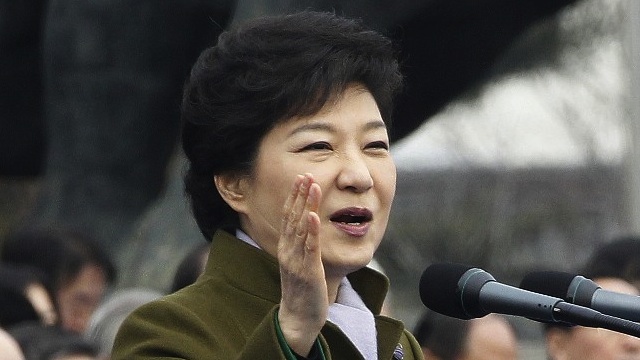SUMMARY
This is AI generated summarization, which may have errors. For context, always refer to the full article.

SEOUL, South Korea (UPDATED) – South Korean President Park Geun-Hye vowed “strong retaliation” Monday, April 1, to any provocation by North Korea after Pyongyang declared it was formally at war with Seoul.
In a meeting with senior military officials and Defense Minister Kim Kwan-Jin, Park said she took the near-daily stream of bellicose threats emanating from the North “very seriously.”
“I believe that we should make a strong and immediate retaliation without any other political considerations if (the North) stages any provocation against our people,” she said.
Park, a conservative who had advocated cautious engagement with the North during her election campaign, has taken a more hardline position since assuming office in February, shortly after the North conducted its third nuclear test.
Military tensions between the two neighbours have been running high for weeks, with the North stepping up its hostile rhetoric against Seoul and Washington.
READ: North Korea places South Korean island in crosshairs
In protest at joint South Korean-US military drills, North Korea last month declared it was ripping up the armistice that ended the 1950-53 Korean War void and threatened a “pre-emptive nuclear strike” on South Korean and US targets.
On Saturday, it announced that it had formally entered into a “state of war” with South Korea.
Seoul and Washington have warned of severe repercussions in the event of any aggression, with the US deploying nuclear capable B-52 and B-2 stealth bombers, as well as F-22 stealth fighters over South Korea as a “deterrence.”
The US military said Monday it had deployed F-22 Raptor stealth fighters to South Korea as part of the ongoing “Foal Eagle” military exercise.
READ: US deploys F-22 stealth fighters to S. Korea
The jets were reportedly flown out of the US air base in Okinawa, Japan.
North Korea has already threatened to strike the US mainland and US bases in the Pacific in response to the participation of nuclear-capable US B-52 and B-2 stealth bombers in this year’s exercise.
The annual gathering of the North’s Supreme People’s Assembly usually scores low on important policy announcements — its role largely limited to unanimously pushing through pre-decided budgets and personnel changes.
Closely watched
But with North Korea having declared itself in a “state of war” with the South, Monday’s session will be closely watched for any sign of the current crisis impacting on the fortunes of members of the ruling elite.
“The North has played most of its political cards, so I don’t see any fresh, tangible threats to come out after the meeting,” said Cho Han-Bum, an analyst at the Korea Institute for National Unification.
“It will probably issue some kind of symbolic statement, like urging all North Koreans to stand ready for a possible war,” Cho said.
The parliament session was preceded by a gathering Sunday of the central committee of the ruling Workers’ Party, chaired by North Korea’s young leader Kim Jong-Un.
The meeting declared that the North’s possession of nuclear weapons “should be fixed by law”, and that its nuclear arsenal should be beefed up “qualitatively and quantitatively”.
On Saturday, North Korea announced it had entered a “state of war” with South Korea and warned that that any provocation would swiftly escalate into an all-out nuclear conflict.
READ: North Korea says at war with South
Both South Korea and the United States chose to downplay the announcement as just another in a long line of rhetorical provocations.
One threat that grabbed more attention related to the possible closure of a joint-Korean industrial complex which lies inside North Korea.
The Kaesong estate — established in 2004 as a symbol of cross-border cooperation — is a crucial source of hard-currency revenue for North Korea which has never allowed past crises on the peninsula to impact its operations.
On Saturday, the North’s state body in charge of the complex said it would shut Kaesong down completely if South Korea continues to affront Pyongyang’s “dignity.”
The border crossing to Kaesong, which lies 10 kilometers (six miles) on the North side, was functioning normally on Monday.
The operating stability of the complex is seen as a true bellwether of inter-Korean relations, and its closure would mark a significant escalation of tensions beyond all the military rhetoric. – Rappler.com
Add a comment
How does this make you feel?
There are no comments yet. Add your comment to start the conversation.